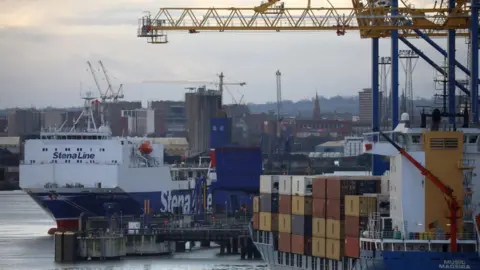EU vaccine export row: Irish government 'in talks' with European Commission
 Reuters
ReutersThe Irish government has said talks are ongoing with the European Commission to work out how to avoid more controversy involving Northern Ireland.
Their talks follow the commission's decision last month to attempt to stop Covid-19 vaccines made in the EU arriving in Northern Ireland.
After condemnation from London, Dublin and Belfast, Brussels made a U-turn.
There are reports that any new EU laws will be checked early on to see if it has implications for Northern Ireland.
The Irish government said there are ongoing regular contacts with the European Commission at official and senior political level.
Irish national broadcaster RTÉ reported that that Republic of Ireland's EU Commissioner Mairead McGuinness will have a role to play in cases in which issues are raised.
The Brexit deal guarantees an open border between the EU and Northern Ireland, with no controls on exported products.
However, Article 16 of the part of the deal relating to Northern Ireland allows the EU and UK to choose to suspend any aspects they consider are causing "economic, societal or environmental difficulties".
 Reuters
ReutersOn 29 January the EU announced it would trigger the clause and introduce the export controls on its vaccines entering Northern Ireland in a bid to prevent the region becoming a backdoor for jabs to be sent to Great Britain.
It was another development in a deepening dispute about delays to the production and distribution of Covid-19 vaccines across the EU.
The EU said the action was "justified" to avert problems caused by a lack of supply for its member states.
But the proposals sparked concern from Taoiseach (Irish Prime Minister) Micheál Martin as well as all five parties in Northern Ireland's devolved government.


There was relief in Dublin, London and Belfast when the European Commission quickly reversed its decision to invoke Article 16 of the Brexit-related Northern Ireland Protocol.
But annoyance too because there was no consultation by Brussels.
The Republic of Ireland wants to avoid a repeat of what happened.
It is seeking to put in place an early-warning system to avoid possible future complications - including in legislation - arising from Northern Ireland being in both the UK's internal market and the EU's single market for goods.

